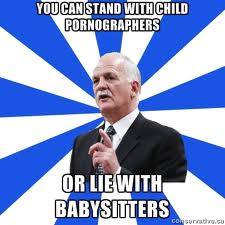
In response to yesterday's post about free trade, John B. provided a detailed commentary that derves a separate posting. Below is what he wrote:
Are any Canadians asking?
I find the current tap dance we are witnessing reminiscent of the public displays of angst and pretense of desperation by Mulroney and Burney a generation ago over the possibility that the Canada-US deal was in peril because of American apprehension. I've always believed that we were the unwitting dupes of a ruse designed to seduce an uninformed public into assuming, without any further analysis and consideration of what it would occasion that, because a negotiating and simultaneously competing business partner had some reservations, the deal must certainly be much more beneficial to Canada than to its supposedly hesitant deal partner at whose expense the anticipated benefit was to be achieved.
On Saturday when I met up socially with a couple of old acquaintances, both university-educated persons, one of them initiated a discussion of the current CETA situation. They're not people who are generally uninformed: one has an honours degree in history; and the other is a retired police chief. Before I had said anything on the subject, one of them introduced a conversation expressing his displeasure that an insignificant region of a country that had been freed from oppression by Canadian efforts during the Second World War would dare to obstruct an enterprise beneficial to Canadian interests. As my grade eight history teacher would have said: "Shades of the CUSFTA." My pal had made the assumption, just as many other Canadians must have done when Mulroney submitted his star performance, that the other side was balking because the relative benefits of the deal were so heavily weighted in Canada's favour. (There must be a term that marketing specialists use for this baloney sales tactic. Maybe it's got its own chapter in "The Art of the Deal" or "Think and Grow Rich".) After listening to the others' comments, I interjected my opinions on the I-SDS and ICS factors, the enhanced corporate opportunity for achieving regulatory capture and the implications of transnational labour mobility, and briefly stated my view that an insignificant component of this and other "trade" deals actually has anything to do with trade and tariffs. Both of them looked at me as though they didn't speak English and then one of them said that he didn't remember whether he had ever even heard of the CETA prior to Friday. The other one then said that he thought he had heard the first mention of he could recall it earlier in the week.
Now consider what they've been putting on the TV regarding this subject since the hiccup in Belgium on broadcasts that purport to be political and economic analysis : Ed Fast lambasting the Liberals for possibly wrecking his deal when all they had to do was to get it signed; Kevin O'Leary, while Evan Solomon grins from the other side of the interview, ranting in full leadership campaign mode that, because of Freeland's apparent failure, we should now question the competence of all of Selfie-Boy Zoolander's cabinet choices; a private equity and derivatives exchange expert telling Michael Serapio that "trade deals are win-win deals" and that the uncertainty in Wallonia is "absolutely appalling"; and, as we should expect, no discussion dealing with the substance of the objections.
So what's my point? It's that there must certainly be some convergence of interests that has willed the Canadian public to be kept in the dark and cooked the pablum we are being served.
What has happened during the CETA negotiations under both political parties seems to have taken it all up a notch. How did Canada become the headwaiter to and chief water carrier for the global investor-rights business lobby? What additional net benefit are we expected to assume will accrue to the country's economy through the adoption of this irregular national policy as a standard practice? Have we become the go-to guy for the transnational commerce management industry? I'll leave it up to someone smarter and better informed to consider those questions. But I'll suggest that an investigation into some revolving doors and the subsequent career choices of former negotiators and political leaders might provide some possible answers. Maybe Dominic Barton could make some explanation that relates to what's happening now under the Sunny Ways Corps.
With respect to Mound's comment on the possibility of abuses in investor claims, it seems that another innovative market has already emerged from the vibrancy and dynamism of the I-SDS protection racket:
http://theindependent.ca/2015/02/10/ceta-what-government-doesnt-want-you-to-know-about-isds-lawsuits/
https://www.linkedin.com/pulse/financial-speculation-corps-vis-lawsuits-isds-court-part-martin-jr-
















